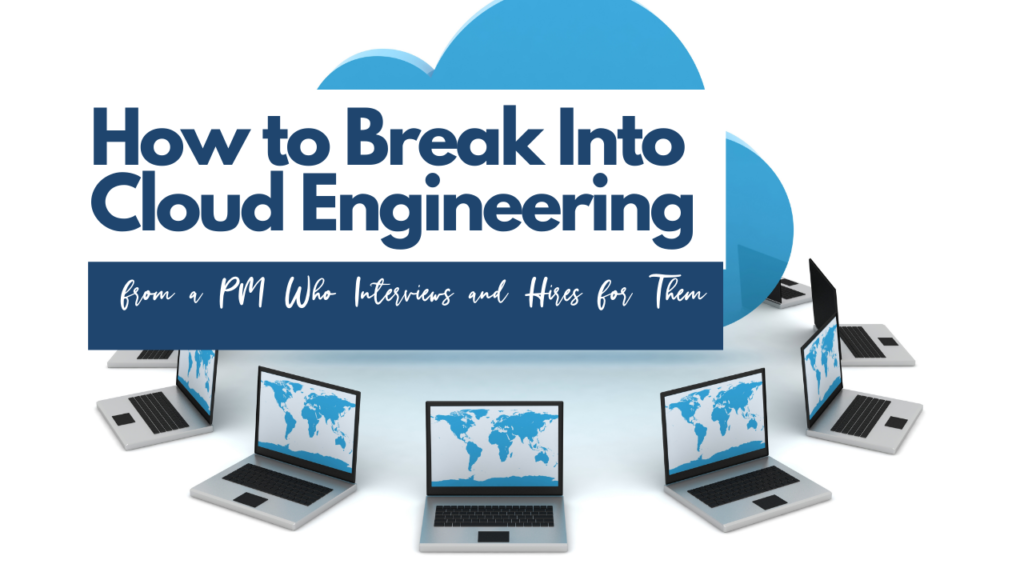Today we’re talking about a topic that I’ve been getting a lot of questions about: how do I break into the cloud engineering world? I’ll tell you what, with a little determination you can do well in Cloud Engineering. It’s a hot career path right now with tons of opportunities, so take note. This is from a program manager who works in cloud engineering
Gain Knowledge of Cloud Technologies
First things first, let’s start with the basics. You’ve got three big cloud providers. Each of these platform has its own strengths. AWS has been around the longest and is the most popular. The Azure platform, Microsoft’s baby, integrates very well with Windows. Lastly, there’s Google Cloud, the new kid on the block but known for data analytics.
You might wonder which one to focus on. Luckily, cloud computing’s core concepts are pretty similar across all three platforms. Once you know the fundamentals, you can use it with any cloud provider. Having said that, every provider has its own set of tools and services, so focus on one or two based on your interests. You might like Google Cloud if you’re interested in big data and machine learning. Azure might be your best bet if you’re interested in hybrid cloud solutions and Windows integration. AWS is the industry leader and has the widest range of options. Choose one or two providers and really get to know their stuff.
Get Certified
So you’ve chosen a cloud provider. So what’s next? Now it’s time to learn the basics. You need to know these core concepts, like cloud architecture, public, private, and hybrid cloud deployments, different service models like IaaS, PaaS, and SaaS, storage, databases, networking, and security, just to name a few. By mastering these fundamentals, you’ll be able to build upon any cloud provider you choose.
How do you actually learn all this? There’s plenty of options for you, my friend. Check out online courses, hands-on labs, official documentation, and certification paths from cloud providers. I really like online courses because they often have video lessons, hands-on activities, and quizzes to reinforce your learning. Cloud computing courses are available on platforms like Coursera, Udemy, and Pluralsight. FreeCodeCamp and Cloud Guru even offer free courses. Learning from the cloud providers’ own learning paths and certifications is another awesome way to learn. There’s an extensive free digital training catalog on all the CSPs. All of these options help you build your cloud skills in a structured and guided way.
Hands-On Experience is Key
There’s no substitute for hands-on experience for preparing you for the real world. It’s time to get your hands dirty and actually build stuff in the cloud. There’s no better way to do that than with free tiers and sandboxes. Cloud providers usually have a free tier where you can access their services and resources for free up to a certain limit. It’s a great opportunity to experiment and get some practical experience. You can create virtual machines, web apps, databases, and just tinker around to your heart’s content. The world of cloud computing requires hands-on learning, I can’t stress that enough. Use those free tiers and just build, build, build.
Don’t be afraid to make mistakes and fix them. Learning is all about making mistakes. You can also get hands-on experience by doing real-world projects. There are lots of online courses and tutorials that offer labs that simulate real-world scenarios. There’s usually step-by-step instructions and guidance in these labs, so learning and troubleshooting is easier. I’ll give you a bonus tip: document your projects. Write a blog post, create a GitHub repository, or keep detailed notes about what you’re doing. In addition to helping you solidify your understanding, this documentation also helps you when you’re applying for cloud engineering jobs. Mastering cloud computing comes down to practice, practice, practice. Let’s get out there, experiment, build, and don’t be scared to fail. Practice makes perfect, so you’ll be more confident and job-ready.
Learning Scripting
It’s time to talk scripting. Well, in the cloud world, automation rules, which is where scripting comes in. I mean scripting languages like Python and PowerShell. Languages like these are like superpowers for cloud engineers, letting you automate tasks, manage infrastructure, and basically make the cloud dance. Think about it, you could write a script to do that for you in seconds instead of manually configuring servers.
Using automation saves you time, reduces errors, and lets you focus on what’s really important. As well as scripting languages, get familiar with IaC tools like Terraform and Bicep. If you don’t come from a programming background, learning scripting might seem intimidating at first, but trust me, it’s not that hard. It’s like a blueprint for your cloud environment, so you can easily recreate it or make changes without having to do everything manually. Online tutorials and courses are available for beginners and advanced students, and the best way to learn is to do it. Begin with simple scripts, then add complexity and ask for help as you go.
Networking and Security
Now let’s get to the nitty gritty: security and networking. These are critical aspects of cloud computing, and as a cloud engineer, you need to know them like the back of your hand. You’ll need to know about IP addresses, subnets, routing, and DNS to make sure your cloud resources can communicate. Security is like a cloud infrastructure security system. Keeping your data, apps, and systems safe from threats, hacks, and unauthorized access is everything. You’ll have to learn about things like firewalls, encryption, identity and access management (IAM), and security groups.
Knowing networking and security isn’t just about knowing acronyms; it’s about understanding how they work together to make cloud infrastructure secure and reliable. Design efficient and secure networks, implement security measures that keep threats at bay, and troubleshoot any problems that may arise. You can learn online using the resources we talked about.
So this is a quick step-by-step on how to become a cloud engineer, particularly if you are new to the field. It’s really exciting to see all of you taking on this challenge. A cloud-based future awaits you, and your skills are in high demand. Feel free to share your thoughts with me.

